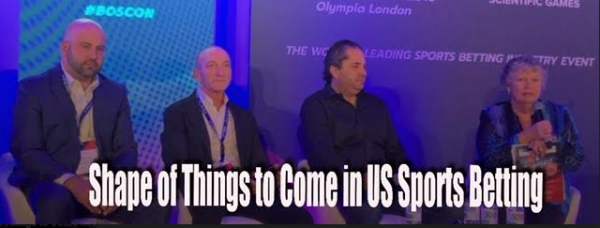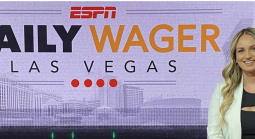Shape of Things to Come in US Sports Betting
-
Panel discussed how US sports betting industry will likely look over next 12 months
-
Sports betting expansion more rapid than any other form of gambling in the sector
-
Patchwork market frustrating to affiliates and operators alike
-
Well funded affiliate firms will mostly keep the little guys at bay
-
Banner geo-targeting does not always work
-
European operators taken aback by "sharps" and syndicates in the US market
|
*Free trial test drive |
So just how will things look in the coming years for legalized sports betting in the US? One of the panel discussions at this week's Betting on Sports conference in London delve into that topic.
The panel consisted of: Jennifer Roberts, Associate Director at the International Center for Gaming Regulation UNLV; Evan Davis, VP and General Counsel, SugarHouse Casino; John Levy, Chairman and CEO, Score Media and Gaming; and Wayne Kimmel, Partner at SeventySix Capital.
Roberts spoke of how sports betting expansion is moving faster than any other sector of gambling.
“There are states that have never embraced casino gambling that are looking at sports betting products. It’s becoming a form of gambling outside of the traditional casino,” she said.
Obstacles standing in the way of state legislation include groups that wield tremendous power such as the Tribes, horse racing associations and, in the case of Louisiana, video poker. This was among the states that came close to legalizing the activity last year.
Roberts said: “We may see Louisiana try again but the politics are challenging. I Don’t see California legislation passing any time soon and there are some big states that will miss out. Massachusetts is pushing for it and Wisconsin is talking about it.”
Taking a forward looking view, Levy told delegates that the industry is at the top of the first innings, and how the game plays out will be determined by a lot of factors. “Look at the customer for a minute,” he said. “Look at how he or she acts. How are they going to bet on sports? What are people doing and what do people want? That’s the view down the road that we’re aspiring to.”
While legalization is viewed as beneficial to gamblers, states (through taxation) and a small number of operators, the patchwork market of varying rules for each state has mostly frustrated gambling firms and affiliates.
James Ashton, Head of Content at FindMyUKCasino.com, told SBC America last week that he believes this state-by-state approach is actually the best blueprint for operators.
Why? Because tailoring and localizing online gambling products and services to individual states and markets delivers the best possible player experience. This is particularly important for online gambling affiliates targeting players in America and beyond as operators now require quality traffic from specific geographical regions.
This may be true but the vast majority of affiliates are finding themselves locked out due to a stranglehold licensing process (witness New Jersey, and perhaps more so, Pennsylvania).
Take New Jersey, for example. An online casino affiliate working with operators in the Garden State must ensure the traffic they attract and refer is located in the state, Ashton writes.
The problem of course is that much of the market - New Jersey's population is around 8 million - is already captured. For the online affiliate, his or her efforts mostly go wasted as a signficant chunk of Web searches for sports betting in New Jersey will originate from other states. For example, it's already been demonstrated that a rather large percentage of those betting sports in the Garden State are individuals traveling in from New York City.
Ashton suggests that affiliiates "localize" their brands by incorporating the name of the jurisdiction in a domain. This typically results in useless spammy information designed exclusively to drive consumers to the affiliate's parners, for whom he or she will receive a cut of player losses.
Catena Media’s playnj.com and uspoker.com defy this notion to some extent by providing useful content and breaking news. They also have the financial means to operate fully staffed news rooms tackling every subject that comes their way.
Ashton advises that affiliates should only partner with online gambling operators that can accept players from the market they are targeting.
This is easy for affiliates that have incorporated the market they are targeting in their name and branding, but can be a little more difficult for those with more generic branding.
But this is easier said than done. In a state like New Jersey, for example, the typical sports bettor (or prospective sports bettor) will already have heard an advertisement for a high converting brand over the radio, perhaps caught a glimpse of a billboard for said brand and, upon searching the Net, will more often than not stumble upon content produced by playnj.com.
It's interesting to note that banner and other creatives geo-targeting does not work for individual countries, so any efforts to incorporate such targeting on a state-by-state basis certainly will prove a failure.
Case in point: Covers.com offers geo-targeting of banners. More often than not, these creatives display based on the regional market offerings. When one visits the state of New Jersey, banners will show for brands that operate in NJ...at least in theory. When one visits Canada, banners should show for brands that operate in that country. However, on countless occasions, European brands not yet licensed in the US have randomly displayed while traveling in the United States for inexplicable reasons.
And now affiliates and operators are faced with yet another dilemma. Apple has implemented a new policy that makes it difficult for online casinos and sportsbooks to run on their platform. This means that, even if an affiliate finds the perfect match for an online sportsbook, that individual may be unable to access via his or her device (assuming its an iPhone). Another lost lead!
Payment processing will likely become more difficult as operators fear violating federal law. A simple example of this would be a resident of New York City betting on an app while in New Jersey and looking to get paid to their New York bank account.
Some of the biggest players in US regulated sports gambling now admit the learning curve is greater than ever anticipated.
A trading director for Golden Nugget said this week at BOSCON: "We underestimated how many sharps there are in the US. There are syndicates everywhere that will destroy you in half an hour if your pricing is off".
Golden Nugget trading director at #BOSCON (British chap): "We underestimated how many sharps there are in the US. There are syndicates everywhere that will destroy you in half an hour if your pricing is off"
— Brad Allen (@BradAllenNFL) September 18, 2019
Needless-to-say, that assessment did not exactly go over very well.
Boy, hang a couple of summer football lines and all of a sudden you think you are Pinnacle without the humidity. Like 10 guys and a few bots moving markets and none of them have g-nugget even on their don best screens.
— Andrew Lange (@LangeBettorIQ) September 18, 2019
Companies like newcomer PointsBet are making a name for themselves in the US regulated market by promoting innovative offerings, but they too are turned off by some states regulatory framework.
Case in point (no pun intended), PointsBet has vowed to stay clear of the Pennsylvania market citing the exorbitant taxes.
“The tax there is very onerous,” PointsBet CEO Johnny Aitken explained. “But to go and bid for a Pennsylvania license," Aitken said. "I’m not so much concerned about the $10 million upfront (licensing) fee, but those operating taxes, which when you average it all out tips over 40 percent, it makes it very hard for us to enter, be aggressive on our offers and price, all the things we need to do to try to win money back from the black market.”
The barrier to entry with most states has more to do with what on the surface appears to be a form of nepotism.
Draftkings and FanDuel are prohibited from entering the Illinois market for two years thanks in no small part to one casino operator's existing entrenchment there. Draftkings and FanDuel are now viewed as two of the biggest threats to operators, and rightfully so. In a matter of months, the two companies combined took control of more than three quarters of the New Jersey regulated sports gambling market, this despite around a dozen companies operating there.
Other states like Oregon and the District of Columbia have opted for a single vendor solution. In both cases, these jurisdictions will rely on their Lottery.
Oregon's rollout is already delayed. Washington, DC is a complete mess, generously speaking.
In fact, the DC situation is akin to a newborn being diagnosed with a life debilitating disease from Day 1.
Already there are threats of lawsuits, claims of cronyism and other warning signs that point to an epic fail. This has prompted Gambling911.com to demote the DC ranking from a "5" to "4" on its State-by-State Competiveness Ranking Index.
The US regulated sports betting market will most certainly have its winners, among them the sports handicapping services, a select number of savvy operators the likes of FanDuel and Draftkings, and an even slimmer number of affiliate partners. Hybrid fantasy and social media platforms like Barstool Bets and Monkey Knife Fight should also benefit, but there are no guarantees these companies won't some day run afoul of the law. Draftkings and FanDuel found this out the hard way when then New York Attorney General Eric Schneiderman went after the two companies with reckless abandonment.
- Alejandro Botticelli, Gambling911.com















